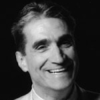Robert Pinsky

Robert Pinsky
Robert Pinskyis an American poet, essayist, literary critic, and translator. From 1997 to 2000, he served as Poet Laureate Consultant in Poetry to the Library of Congress. Pinsky is the author of nineteen books, most of which are collections of his poetry. His published work also includes critically acclaimed translations, including The Inferno of Dante Alighieri and The Separate Notebooks by Czesław Miłosz. He teaches at Boston University...
NationalityAmerican
ProfessionPoet
Date of Birth20 October 1940
CityLong Branch, NJ
CountryUnited States of America
I don't like to have a calm, orderly, quiet place to work. I often compose while driving, compose in my head. It is true that I wrote my little book, 'The Sounds of Poetry, A Brief Guide,' almost entirely in airplanes and airport departure lounges.
If I live near a dancer or a painter, or a clarinet player comes from my neighborhood, I take some pleasure in that, feel a little more as if I come from someplace in particular.
I delight sometimes in saying to - as when I'm a teacher, I love saying, 'This is really important, so don't write it down.' To me, what you retain is a very important filter.
It's true that school can poison things - some people hate W.C. Williams' little poem about the wheelbarrow because somebody bullied them with it in school,
The best argument for teaching poetry is to put a three-year-old or a four-year-old and read Dr. Seuss, or Robert Louis Stevenson, and to feel how the child and you are engaging in something that's really basic to the animal, which is passing on in these rhythmic ways, something that came from somewhere.
All questions of process require an answer that begins with a very important sentence, and the sentence is: 'Everybody is different.' Whatever way of working you name - methodical, haphazard, gets up early in the morning, sleeps all day, works at night, revises immensely, never revises at all - someone has made great work with that way.
For an American, there's no automatic place where people love the art of poetry. There's not a social class that considers poetry its property the way in some countries there's a snob value to the art.
For a lot of people, well-meaning teaching has made poetry seem arcane, difficult, a kind of brown-knotting medicine that might be good for you but doesn't taste so good. So I tried to make a collection of poetry that would be fun. And that would bring out poetry as an art, rather than the challenge to say smart things.
Jazz and poetry both involve a structure that may be familiar and to some extent predictable. And then, you try to create as much surprise and spontaneity and feeling and variation while respecting that structure.
I think my first experience of art, or the joy in making art, was playing the horn at some high-school dance or bar mitzvah or wedding, looking at a roomful of people moving their bodies around in time to what I was doing. There was a piano player, a bass player, a drummer, and my breath making the melody.
Poetry is the most bodily of the arts.
The poetry I love is written with someone's voice and I believe its proper culmination is to be read with someone's voice. And the human voice in that sense is not electronically reproduced or amplified.
For Aliki Barnstone, poetry seems a natural medium. The vision and cadences of these poems suggest a sensibility for which poetry is as inevitable as breathing or eating.
Even in the scorched and frozen world of the dead after the holocaust The wheel as it turns goes on accreting ornaments.